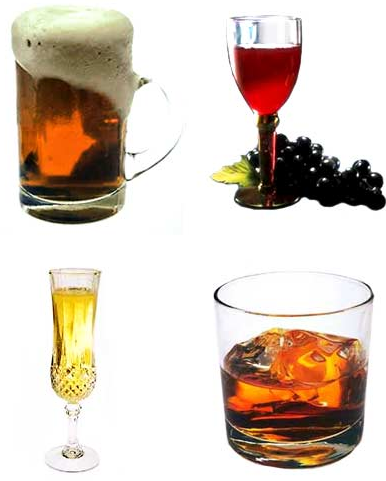DRUGS & ALCOHOL 101
A Parent Resource, presented by Eric Munson, CPP, ICPS
ALCOHOL FACTS
Street Terms: Booze, brews, hooch, juice, sauce, and more.

What is It?
Alcohol is created when grains, fruits, or vegetables are fermented, a process that uses yeast or bacteria to change the sugars in the food into alcohol. When alcohol is consumed, it's absorbed into a person's bloodstream. From there, it affects the central nervous system (the brain and spinal cord), which controls virtually all body functions. Alcohol actually blocks some of the messages trying to get to the brain. This alters a person's perceptions, emotions, movement, vision, and hearing. Alcohol has different forms and can be used as a cleaner or antiseptic; however the kind of alcohol that people drink is ethanol, which is a sedative.
Alcohol Effects
| Short-term effects |
|
Slurred Speech |
Drowsiness |
Impaired Judgement |
|
Vomiting |
Diarrhea |
Decreased perception/coordination |
|
Upset Stomach |
Headaches |
Blackouts (memory lapses) |
|
Long-term effects
|
|
Unintentional injuries |
Increased family problems |
Alcohol poisoning |
|
High blood pressure & stroke |
Liver disease |
Sexual problems |
| |
Permanent brain damage |
Ulcers |
|
Risks
- Difficulty walking
- Blurred vision
- Slurred speech
- Slowed reaction times
- Impaired memory and blackouts
- Mental confusion
- Paralysis of the nerves that move the eyes
- Difficulty with muscle coordination
- Persistent learning and memory problems
- Liver disease
- Unintentional injuries
- HIV risk due to impaired judgment
Alcohol poisoning, which includes the following:
- Mental confusion, stupor, coma, or person cannot be roused
- Vomiting
- Seizures
- Slow breathing (fewer than eight breaths per minute)
- Irregular breathing (10 seconds or more between breaths)
- Hypothermia (low body temperature), bluish skin color, paleness
- Heart beats irregularly or stops
- Hypoglycemia (too little blood sugar), which leads to seizures
- Untreated severe dehydration from vomiting, which can cause seizures.